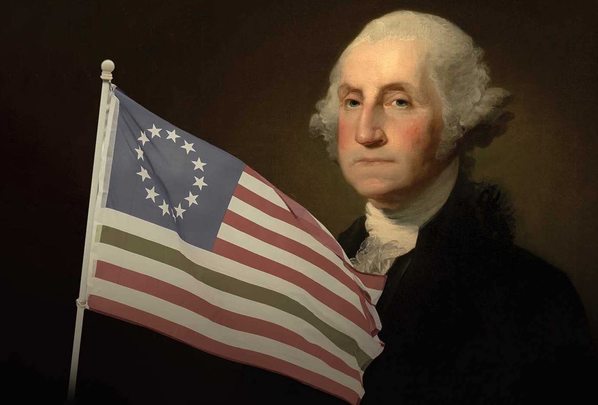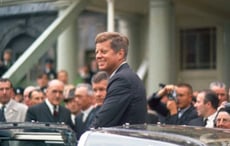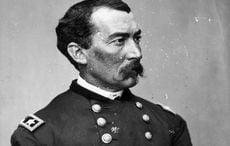IrishCentral founder and Irish Voice publisher Niall O’Dowd’s new book on the history of Ireland’s instrumental role in the creation of the United States, "George Washington and the Irish: Incredible Stories of the Irish Spies, Soldiers and Workers Who Helped Free America," reveals many stories about the Irish heroes who fought the British for the new United States of America.
This excerpt highlights John Fitzgerald from Wicklow, who crossed the Delaware by Washington’s side.
The diary entries of Irish-born Colonel John Fitzgerald on George Washington's crossing of the Delaware, December 25-26, 1776, are one of the most fascinating documents of the War of Independence.
Fitzgerald, a native of County Wicklow, came to America in 1769 as a young man, probably born around 1750. He was Roman Catholic and a successful businessman who lived close to Mount Vernon. He was a dear friend of Washington before, during, and after the Revolutionary War. He was close to the Jesuits, which might indicate that, like many other Catholics of means in Ireland, he fled to France for education because of the crushing Penal Laws aimed at dismembering Catholicism.
Much of the account of the life of John Fitzgerald and his critical role in guarding Washington and being among his closest allies was first set forth in Martin Griffin’s Catholic scholarly journal, The American Catholic Historical Researches.
Much of Griffin’s material was, in turn, collected in a book called The American Revolution in the Delaware Valley by Edward S. Gifford, Jr.
Griffin began editing in 1886 and started publishing deeply researched information on the key Catholics around Washington at the time, most notably Fitzgerald, whose diary he accessed. He also researched Stephen Moylan, who served for a time as chief aide to Washington. Moylan would become better known only in recent times when it was proven that he was first to use the name “United States of America” for the embryonic country.
After his spell as chief aide, he formed the legendary Moylan’s Dragoons, the best cavalry outfit in the U.S. Army – so famous that one of the most notable songs of that era featured his dragoons.
Fitzgerald’s account of the Delaware crossing is one of the very few eyewitness accounts of a landmark moment in American history. The subsequent attack and victory over Hessian mercenaries, who were paid by the British to hold Trenton, was the turning of the tide, as Washington was reeling from several defeats and being chased out of New York.
So bad was the situation that Lord Cornwallis went back to London to inform King George III that the rebellion was all but defeated. Meanwhile, his main general, General William Howe, was setting the party scene alight in New York, resplendent in his Redcoat regalia at numerous events. As far as Cornwallis and Howe were concerned, the war was shut down until spring.
It was a depressing moment for the Patriots, enlightened only by the lines written by English revolutionary Thomas Paine which Washington had distributed to every man: “These are the times that try men's souls; the summer soldier and the sunshine patriot will, in this crisis, shrink from the service of his country; but he that stands it now, deserves the love and thanks of man and woman. Tyranny, like hell, is not easily conquered; yet we have this consolation with us, that the harder the conflict, the more glorious the triumph.”

Love Irish history? Share your favorite stories with other history buffs in the IrishCentral History Facebook group.
So crossing the Delaware and carrying out a surprise attack in the dead of winter seemed like Washington’s only hope. As he readied his men, he told them to stay close to their officers; as usual he exuded calm and control. Fitzgerald’s excerpt begins: "Christmas, 6 PM … It is fearfully cold and raw and a snowstorm is setting in. The wind is northeast and beats in the faces of the men. It will be a terrible night for the soldiers who have no shoes. Some of them have tied old rags around their feet, but I have not heard a man complain … I have never seen Washington so determined as he is now … He stands on the bank of the stream, wrapped in his cloak, superintending the landing of his troops. He is calm and collected, but very determined. The storm is changing to sleet and cuts like a knife…
“[3 AM] I am writing in the ferry house. The troops are all over, and the boats have gone back for the artillery. We are three hours behind the set time … [the fishermen directing the boats] have had a hard time to force the boats through the floating ice with the snow drifting in their faces…
“It was broad daylight when we came to a house where a man was chopping wood. He was very much surprised when he saw us. ‘Can you tell me where the Hessian picket is?’ Washington asked. The man hesitated, but I said, ‘You need not be frightened, it is General Washington who asks the question.’ His face brightened, and he pointed toward the house of Mr. Howell.
“It was just eight o’clock. Looking down the road I saw a Hessian running out from the house. He yelled in Dutch and swung his arms. Three or four others came out with their guns. Two of them fired at us, but the bullets whistled over our heads. Some of General Stephen’s men rushed forward and captured two. The others took to their heels, running toward Mr. Calhoun's house, where the picket guard was stationed, about twenty men under Captain Altenbockum. They came running out of the house. The captain flourished his sword and tried to form his men. Some of them fired at us, others ran toward the village.
“The next moment we heard drums beat and a bugle sound, and then from the west came the boom of cannon. General Washington's face lighted up instantly, for he knew that it was one of [General John] Sullivan's guns.
“We could see a great commotion down toward the meeting house, men running here and there, officers swinging their swords, artillerymen harnessing their horses. Captain Forrest unlimbered his guns. Washington gave the order to advance, and rushed on to the junction of King and Queen streets. Forrest wheeled six of his cannons into position to sweep the streets. The riflemen under Colonel Hand and Scott’s and Lawson’s battalions went upon the run through the fields on the left to gain possession of the Princeton Road. The Hessians were just ready to open fire with two of their cannons when Captain [William] Washington and Lieutenant [James] Monroe with their men rushed forward and captured them.
“We saw [Colonel Johann] Rall [commander of the Hessians] riding up the street from his headquarters, which were at Stacy Potts’ house. We could hear him shouting in Dutch, ‘My brave soldiers, advance.’
“His men were frightened and confused, for our men were firing upon them from fences and houses and they were falling fast. Instead of advancing they ran into an apple orchard. The officers tried to rally them, but our men kept advancing and picking off the officers. It was not long before Rall tumbled from his horse and his soldiers threw down their guns and gave themselves up as prisoners…
“[9 PM] … I have just been with General Washington and [Nathanael] Greene to see Rall. He will not live through the night. He asked that his men might be kindly treated. Washington promised that he would see they were well cared for."
A long account of Fitzgerald is given in Griffin’s The American Catholic Historical Researches for January 1909 of “Colonel John Fitzgerald, Aide-de-Camp and Secretary to Washington.”
Griffith wrote: “It will be interesting to our readers to gain from this article an idea of the very intimate relations that existed between General Washington and some of the prominent Irish Catholics of his day. One of the first was John Fitzgerald, a young Irishman who settled in that town [Alexandria, Virginia] in 1769 or 1770.
“In youthful manhood, he had the reputation of being one of the rising businessmen and a favorite, even in the social life of the town. It shows social import and intelligence to have, so early, made the acquaintance of Colonel George Washington of Mount Vernon, who, after his services in the French and Indian War, and his cooperation with others against the Stamp Act and other unjustifiable actions of the British ministry, had settled down to the peaceful life of a Virginia planter."
Griffin says that, in December 1770: “Fitzgerald was elected by Burgess [a councilman] and that, thereupon, he gave a ball at which it is said he first met Mr. Washington, though no intimacy resulted from the first interview. The genial young Irishman became readily a favorite with the Scotch and English maidens in Alexandria; but not from them did he choose his wife … Fitzgerald, by marrying into a family whose home was opposite to Washington’s home, would naturally become on visiting terms with the Washington household, in any event.”
Visits by Fitzgerald to Washington’s home are recorded on 80 different occasions during this time. When it came time for war, there was no doubt who Washington wanted by his side.
Griffin wrote: “When Washington, in 1775, in Cambridge, Massachusetts, took command of the Continental Army, under the Old Elm still standing near Harvard Square, Fitzgerald was at his side … When the Revolutionary War came on, young Fitzgerald joined the forces of Washington at Cambridge, Massachusetts, as Aide-de-Camp to the General.”

Love Irish history? Share your favorite stories with other history buffs in the IrishCentral History Facebook group.
Griffin additionally notes: “In November, the same year, Fitzgerald was appointed one of the secretaries of Washington; as his fellow Catholic, Stephen Moylan of Philadelphia, had, on March 6, 1776, been appointed secretary to the General, who thus, in the memorable year of Independence, had two Catholics, born in Ireland, as his Aides and Secretaries.”
Adds Griffin: “Their worthiness may be judged by Washington's letter to Congress on April 23, 1776, in which he stated: ‘Aides-de-Camp are persons in whom entire confidence must be placed: it requires men of abilities to execute the duties with propriety and despatch, where there is a multiplicity of business as must attend the Commander-in-Chief of such an army as this; and persuaded I am that nothing [motivates these men] but the zeal of those gentlemen who live with me and act in this capacity, for the great American cause and personal attachment to me.’”
Fitzgerald and Moylan were not doing it for the money. The pay was $33 a month. It was raised to $40. The rank was Lieutenant-Colonel.
“In all the operations of the army,” wrote Griffin, “Colonel Fitzgerald from 1776 to 1782, save occasional leaves of absence, and then for military purposes, is found constantly by the side of Washington, especially in action. Nor does he appear among those with ‘promptness seek preferment’ because of hard duty and inadequate pay; but ever one constant and faithful in devotion to his adopted country and with fidelity and affection for the Commander-in-Chief.”
Griffin then alludes to the Conroy plot to replace Washington as commander. Thomas Conroy was himself Irish, from Kerry, and the plotters became known as the Conway Cabal.
As Griffin notes: “At times during the war, intrigues were carried on looking toward the superseding of General Washington by General Gates. Among others concerned was General Conway, who, it was alleged, had written a letter to Gates, containing these or similar words: ‘Heaven has determined to save your country, or a weak General and bad councillors would have ruined it.’ Washington turned to Fitzgerald and wrote to him to uncover and expose the plot.”
Per Griffin, Fitzgerald replied as follows: “’Alexandria, March 17, 1778. Sir: I am honored with your kind favor of the 28 ult., which I received by last Sunday's post. It gives me the most pleasing satisfaction to find that those who were endeavoring to injure you in the Public esteem, are becoming sensible of their own insignificance and earnestly hope they may feel the contempt and scorn of all good men in proportion to the Iniquitous scheme which they expected to accomplish. Whatever expectations some individuals in Congress might have formed from joining with this junto ...’ The letter was endorsed in Washington's hand. ‘Colonel Fitzgerald '"17th March 1778.’”
Under this in a recent hand is written: “Was among General Washington's aides-de-camp of '76. He was a warm-hearted brave and honest Irishman, a merchant of Alexandria before the War.”
The plot was foiled in large part by Fitzgerald, once he ascertained who the miscreants were and called them out.
As Griffith notes: “It is to the imperishable honor of Colonel Fitzgerald that, amid Washington's distresses at Valley Forge, he was resolute in upholding the character and fame of the illustrious General ... Let us honor John Fitzgerald that he was an instrument in unearthing the conspiracy against the ‘great and good.’”
Fitzgerald witnessed one of Washington’s greatest moments in battle. The Catholic World described it as “the most graphic incident of Fitzgerald’s connection with the great commander.” The incident in question, a scene at the battle of Princeton, was described by George Washington Parke Custis, the adopted son of Washington, in his memoirs: “We have often enjoyed a touching reminiscence of that ever memorable event from the late Colonel Fitzgerald, who was aide to the chief, and who never related the story of his general’s danger without adding to his story the homage of a tear.”
Washington’s army, between Trenton and Princeton, encountered two British battalions and the fighting was fierce. The Americans were being driven back until Washington urged his steed forward to better to direct his army’s musket fire.
Washington was now out in front of his men and a despairing Fitzgerald watched as the bullets flew closer. Finally, Fitzgerald could take it no more and, convinced Washington would be shot by either friendly fire or British muskets, buried his face in his hat unable to watch.
He was aroused a few moments later by Washington riding up to him unscathed. The tough young Irishman broke down in tears. Washington smiled and grasped his young friend’s hand and simply said, “The day is ours.”
Griffin adds an interesting addendum: “At the critical moment of the retreat of Mercer’s men, and when Washington was rallying the stricken force, John Mullowney, a Philadelphia Catholic boy, a drummer with the Philadelphia militia, pounded out ‘Yankee Doodle’ with so much spirit and force that the waning courage of the soldiers revived and forced the British to retreat. He afterwards became an officer of the Navy under Commodore John Barry.”
It was Colonel Fitzgerald who gladly informed a deeply relieved Mrs. Washington that her husband had triumphed at Trenton and Princeton.
After the war, Fitzgerald was one of four men chosen by Washington as board members of his Potomac Company to create a new channel for the Potomac River, which would greatly expedite the passage of goods. The two men continued to be close.
Griffin notes: "St. Patrick's Day, 1788, was also election day in Virginia for the choice of delegates to the State Convention, which should ratify or reject the Federal Constitution proposed at Philadelphia in 1787. Washington came from Mount Vernon to vote for candidates in its favor; and Colonel Fitzgerald entertained him at a dinner party, to which some of the principal inhabitants of the town were invited.
“July 4, 1799, Independence Day was celebrated in Alexandria. Washington was present and, after Colonel Fitzgerald had put the military commands through the manual, Washington expressed his satisfaction with their military and elegant appearance.
“August 7, 1799, Colonel Fitzgerald dined with Washington, and in November of the same year the General visited Alexandria on business and dined at the city hotel with Fitzgerald.”
It was Washington’s last public appearance beyond Mount Vernon. In the early winter of 1799, he died. John Fitzgerald followed soon after.
As Griffin notes: “He is buried in the Catholic cemetery of Alexandria, on the road to Mount Vernon, the home of his General and the resting place of his remains.”
As always, he is in sight of his leader.
"George Washington and the Irish: Incredible Stories of the Irish Spies, Soldiers and Workers Who Helped Free America," is now available via Amazon, Barnes & Noble, and independent book stores throughout the U.S. On Sunday, March 20, Niall O’Dowd will discuss his work at a reading at Theodore’s Books, 17 Audrey Avenue, Oyster Bay, Long Island, at 2 pm.

Love Irish history? Share your favorite stories with other history buffs in the IrishCentral History Facebook group.




Comments